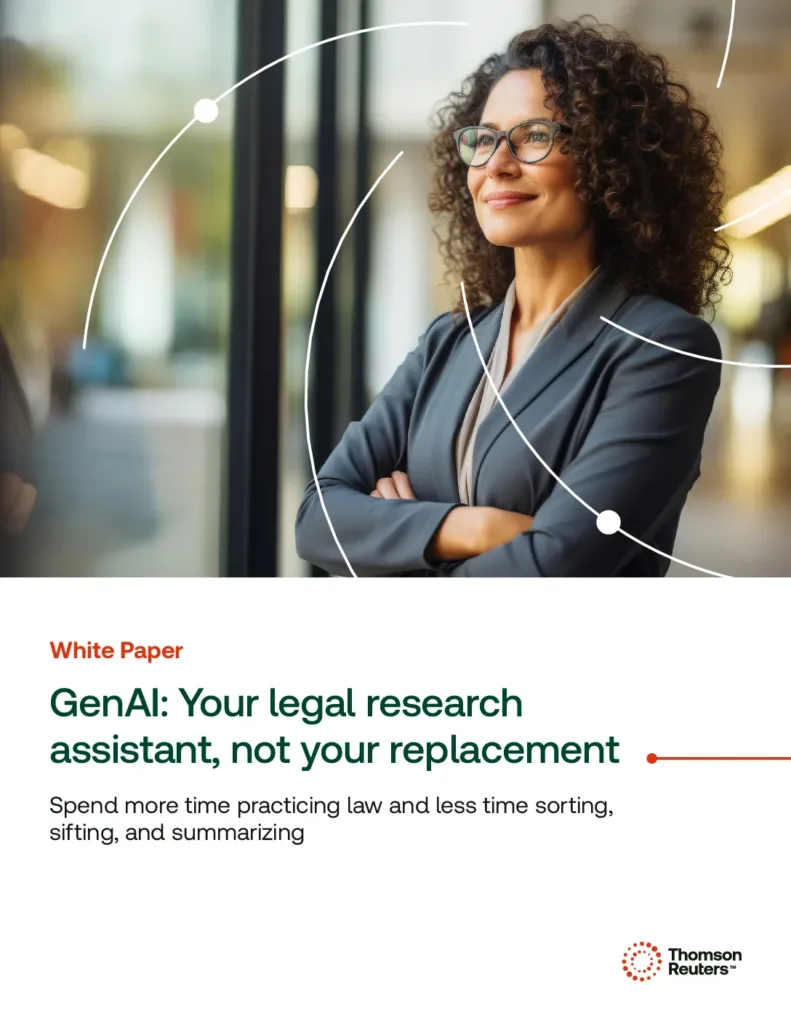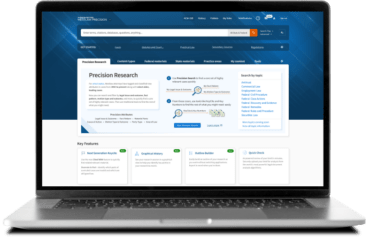Complete your due diligence faster, with higher confidence
There’s no doubt artificial intelligence (AI) is reshaping our world. From personal to professional applications, it allows us to analyze large data sets, integrate them into actionable insights, and improve decision-making. Generative AI (GenAI) is a subset of AI that uses large language models (LLM) to create new content based on user prompts. This is delivered in the form of text, images, videos, audio, and even software code.
In the legal realm, GenAI is helping lawyers in a number of ways, including GenAI research tools. Generative AI for legal research boasts clear benefits: It saves time and increases efficiency. GenAI research tools can process and analyze vast amounts of legal texts much faster than humans, allowing you to focus on tasks uniquely suited to your experience and expertise – something GenAI research tools can’t handle.
In a Thomson Reuters 2024 survey, respondents predicted it could save them as much as 12 hours per week, with as many as four hours per week in the next year alone. That’s the equivalent of adding a full-time colleague among ten lawyers using it.
Getting there with confidence
Embracing the idea of GenAI research tools is one thing. Trusting it in use is another. You’ve probably heard about AI hallucinations. That’s where the GenAI tool “generates” answers based on patterns rather than factual resources. To take full advantage of the ground-breaking benefits of GenAI, first, ensure your research platform is trained on trusted content.
AI-Assisted Research on Westlaw Precision seamlessly blends advanced technology with trusted content. Westlaw has leveraged artificial intelligence to provide editor-created answers for over a decade, and now its AI-Assisted Research crafts tailored responses to your queries in real-time, across various jurisdictions.
AI-Assisted Research on Westlaw Precision with CoCounsel directs the LLM to focus on the precise language of cases, statutes, and regulations. Rather than generating text based on the question, it searches through content to find the most relevant cases, statutes, and regulations. This ensures that responses are based on the most pertinent portions of these sources, providing accurate and reliable answers.
 |
AI-Assisted Research for transactional lawyers
When most people think of legal research, they think litigation. But due diligence, the transactional lawyer’s daily work, can reap the benefits of AI-Assisted Research as well. Drafting contracts, negotiating commercial arrangements, and helping clients figure out how to best carry out their transactions are all foundational aspects of transactional work. Each agreement requires not just a basic understanding of transactional legal principles, but also specific research tailored to the particular transaction.
Drafting contracts: Crafting effective contracts demands a thorough understanding of legal terms and their implications to safeguard all parties’ interests and meet legal standards. AI-Assisted Research can analyze large volumes of precedents and current case law to provide clauses and language that have been judicially tested, thereby reducing the risk of future disputes.
Negotiating commercial arrangements: Successful negotiations rely on up-to-date knowledge of legal developments and industry norms. AI-Assisted Research provides insights into current commercial practices and identifies relevant regulatory requirements, equipping lawyers with the necessary information to negotiate favorable terms.
Enhanced legal strategy: By leveraging AI-Assisted Research, lawyers can develop more robust legal strategies. The ability to quickly access and interpret relevant legal information allows lawyers to advise clients with greater confidence, identifying the best actions to take moving forward. This proactive approach helps prevent legal issues before they arise, ensuring smoother transactions.
AI-Assisted Research in Westlaw Precision with CoCounsel not only enhances the efficiency and accuracy of legal research but also empowers lawyers to provide more informed, strategic advice in transactional work. It can help you get a jumpstart on your legal research, so you can respond to your clients quicker.

CoCounsel
Bringing together generative AI, trusted content and expert insights
Meet your legal AI assistant ↗










